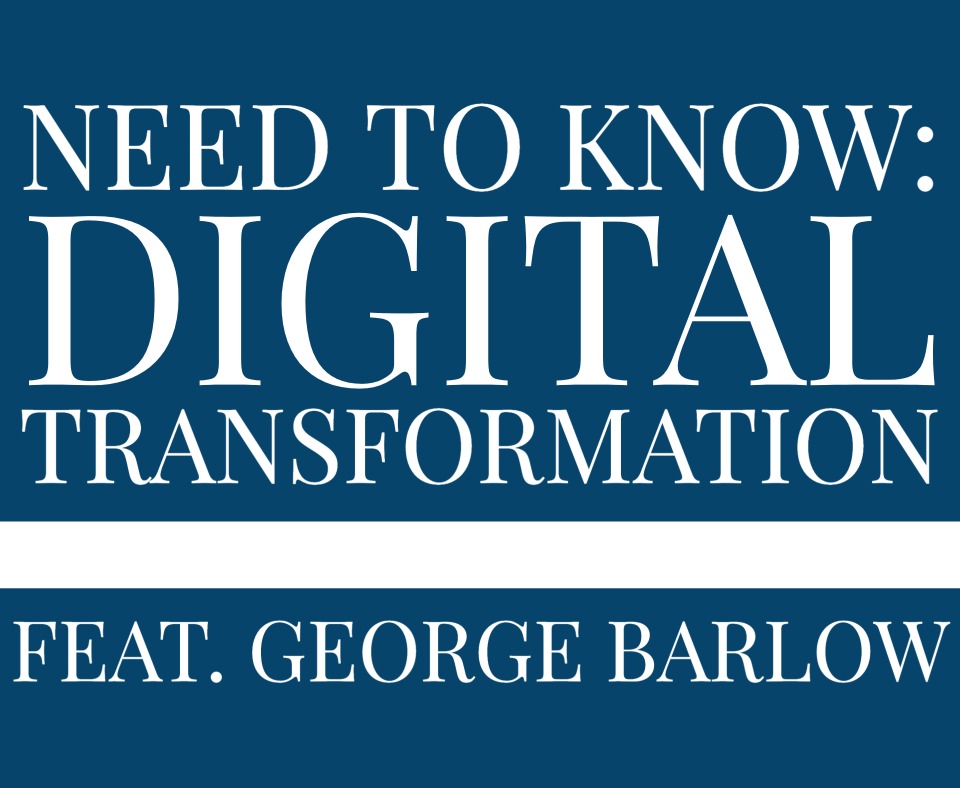Gregg Rock interviews George Barlow.
We are especially excited to let folks know that George is going to be presenting two of our newest courses that are part of the Digital Transformation Specialist series in our Summer Session 1 Training Event.
GR: I first met George, and started working with him, back when he was with Appian, and back then, George was one of the first folks to bring Process to the Cloud as a SAS product. So, George, I wanted to pick your brain for our Members today and ask you what you’re seeing as most significant these days and what’s happening with the migration to cloud computing
GB: There are a few things about the migrating to cloud computing over the past decade that stand out to me.
The first one is the growth and sophistication of the whole cloud infrastructure—it’s amazing to see things like containerization, being able to run things and multiple containers on the same servers to get scale.
The idea of on demand resource configuration, and the fact that we can make computers bigger and smaller as the workload changes, is pretty phenomenal.
And then we look at concepts like IoT, the Internet of Things, and we’re seeing lots of technologies there, including what I call edge computing. Edge computing is to put the power of smaller servers out to satisfy IoT, and then keep cascading up the largest servers, which is really interesting.
And then, finally, one that many organizations are familiar with from their marketing and sales organizations is this whole distributed storage and delivery mechanisms, Amazon S3 is a really good example of that. So whole industries have spun up just by the fact that the Cloud exists and it’s very cost effective. That sophistication has been fun and exciting to watch.
GR: That’s great. And George, for our Community of Members that have been BPM practitioners for several years now (in some cases, 5 or 10 years), what connection will you help them make to some of these concepts with the upcoming classes that you’re going to be delivering in April?
GB: So, based on what I was talking about with the changes in the Cloud and it’s maturing and so forth, it actually changes the way we do, or should be thinking about, designing systems. It’s a new paradigm. And, of course, lots of companies have lots of experience—it isn’t brand new, but thinking about it on scale and really beginning to understand the impact of things like Low Code/ No Code connected to model driven applications is a different way of thinking. And this whole idea of API forward and being able to connect with web hooks and stuff like that is a big deal.
But the growth and maturing of the programming conventions themselves it’s pretty interesting. The browser has become ubiquitous, it’s everywhere, it’s the way we deliver applications now, is through browser applications. So, what’s happened is we now allow web applications to run practically anywhere, on virtually any device, and it’s all the same. I mean, it’s the same experience on an iPhone or smartphone as it is on a tablet, as it is on a laptop, as it is on a workstation and that’s pretty amazing. That’s really the browser’s great contribution to the world that we live in.
So, bringing all these kinds of ideas together—the API’s and the web hook technologies—really allows the seamless interconnection and the creation of composite apps and that whole idea is, again, changing the way we think about things, and how we use the Cloud to deliver value to our customers.
Editor’s Note: This is a five-part article and video series.
Watch the entire Need to Know: Digital Transformation video series.
Read the other articles in the series here:
Article 1: What do BPM Practitioners Need to Know about Low Code/No Code?
Article 2: What is the Current State of Process Automation?
Article 3: How Does AI and Machine Learning Fit Into Low Code/No Code and Process Automation Environments?
Article 4: What is the Triple Crown of Modeling? BPMN, DMN, & CMMN Explained.
Want to be featured in the next Need to Know series to share your expertise? Get in touch – we’d love to hear from you.

















